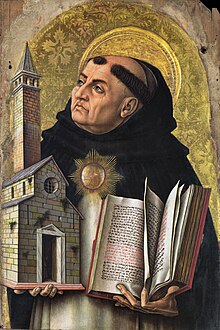
Back Thomas van Aquino Afrikaans Thomas von Aquin ALS ቶማስ አኳይናስ Amharic Sant Tomás d'Aquino AN توما الأكويني Arabic توماس اكويناس ARZ Tomás d'Aquinu AST Akvinalı Foma Azerbaijani توماس آکوویناس AZB Фома Аквинский Bashkir
Thomas Aquinas OP (/əˈkwaɪnəs/, ə-KWY-nəs; Italian: Tommaso d'Aquino, lit. 'Thomas of Aquino'; c. 1225 – 7 March 1274) was an Italian[6] Dominican friar and priest, an influential philosopher and theologian, and a jurist in the tradition of scholasticism from the county of Aquino in the Kingdom of Sicily.
Thomas was a prominent proponent of natural theology and the father of a school of thought (encompassing both theology and philosophy) known as Thomism. He argued that God is the source of the light of natural reason and the light of faith.[7] He embraced[8] several ideas put forward by Aristotle and attempted to synthesize Aristotelian philosophy with the principles of Christianity.[9] He has been described as "the most influential thinker of the medieval period"[10] and "the greatest of the medieval philosopher-theologians".[11] According to the English philosopher Anthony Kenny, Thomas was "one of the greatest philosophers of the Western world".[12]
Thomas's best-known works are the unfinished Summa Theologica, or Summa Theologiae (1265–1274), the Disputed Questions on Truth (1256–1259) and the Summa contra Gentiles (1259–1265). His commentaries on Christian Scripture and on Aristotle also form an important part of his body of work. He is also notable for his Eucharistic hymns, which form a part of the Church's liturgy.[13]
As a Doctor of the Church, Thomas Aquinas is considered one of the Catholic Church's greatest theologians and philosophers.[14] He is known in Catholic theology as the Doctor Angelicus ("Angelic Doctor", with the title "doctor" meaning "teacher"), and the Doctor Communis ("Universal Doctor").[a] In 1999, John Paul II added a new title to these traditional ones: Doctor Humanitatis ("Doctor of Humanity/Humaneness").[15]
- ^ Cite error: The named reference
diobethwas invoked but never defined (see the help page). - ^ Cite error: The named reference
resurrectionpeople.orgwas invoked but never defined (see the help page). - ^ Cite error: The named reference
catholicsaints.infowas invoked but never defined (see the help page). - ^ Maritain, Jacques (2005). An Introduction to Philosophy. Translated by Watkin, E. I. Lanham, Maryland: Rowman & Littlefield Publishers, Inc. p. 112. ISBN 9781461667377.
- ^ Cite error: The named reference
SEPwas invoked but never defined (see the help page). - ^ Conway 1911; Vaughan 1871.
- ^ "Thomas Aquinas, Commentary on the De Trinitate of Boethius, quest. 2, art. 3". Archived from the original on 18 September 2021. Retrieved 22 February 2021.
- ^ Cite error: The named reference
SEP3was invoked but never defined (see the help page). - ^ Blair, Peter. "Reason and Faith: The Thought of Thomas Aquinas". The Dartmouth Apologia. Archived from the original on 13 September 2013. Retrieved 18 December 2013.
- ^ Wippel, John F. (1995) 2nd ed., "Aquinas, Saint Thomas", The Cambridge Dictionary of Philosophy, Cambridge University Press. p. 36.
- ^ Broadie, Alexander (1999). "Aquinas, St Thomas", The Oxford Companion to Philosophy, Oxford University Press, p. 43.
- ^ Aquinas, Thomas (1993). Selected Philosophical Writings. Oxford University Press. p. xi. ISBN 0-19-283585-8.
- ^ "St. Thomas Aquinas | Biography, Philosophy, & Facts". Encyclopædia Britannica. Retrieved 20 January 2020.
- ^ Aquinas, Thomas (1993). Selected Philosophical Writings. Oxford University Press. pp. Xi. ISBN 0-19-283585-8.
- ^ "Inter Munera Academiarum (January 28, 1999) | John Paul II". www.vatican.va.
Cite error: There are <ref group=lower-alpha> tags or {{efn}} templates on this page, but the references will not show without a {{reflist|group=lower-alpha}} template or {{notelist}} template (see the help page).
© MMXXIII Rich X Search. We shall prevail. All rights reserved. Rich X Search
